What does it mean todemocratize HR? and Why?
The pandemic has changed the reality of work and workplace for most organizations and the biggest spotlight has been on HR. They had to think on their feet to, primarily, secure the physical and mental health of its workforce, create an ecosystem of organizational empathy, and make sure the productivity levels stayed the same, if not increased.
While most organizations were on a journey of steady and gradual digital transformation, the pandemic drastically sped up the process owing to the growing need to find better ways of working. Whether it was enabling vaccination drives, providing the right infrastructure for ‘work from home’ or catering to the ever-evolving expectations of Gen-Z and Millennial workforce, HR departments had a lot on plate.
One thing is clear, though. There’s no room for inertia. Managing the wellbeing, syncing millennial expectations, delivering tailored experiences to employees, handling individual burnouts, and yet maintaining productivity is no longer possible with traditional operating models of HR. Leaders are realizing the complexity of processing this strategic shift and what it is going to take to steer their organizations towards sustainable growth.
Traditional models of HR are not enough to meet the new-age expectations of the workforce

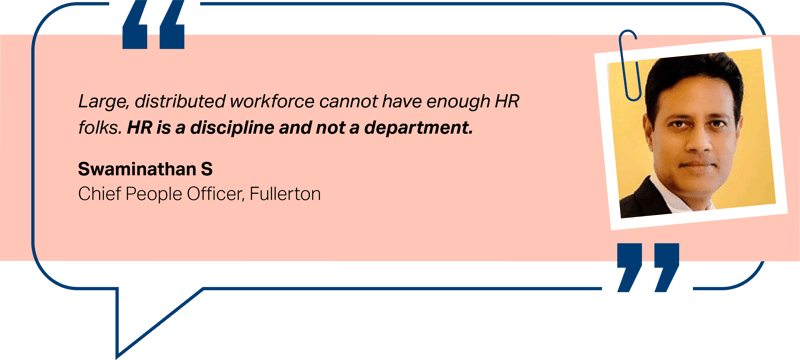
The answer lies in democratization of the HR function - Make managers your new HRs.
Take a while. Let that thought sink in.
Since managers are the closest to their team, it only makes sense to empower them with the knowledge, tools and data that will help them become the new HRs.
Going forward, the growth of organizations will rely on managers becoming the advocates for their team, counselors for maintaining harmony within, mentors for ensuring performance and catalysts to push innovation and organizational ambition while maintaining trust in the team. This would require a categorical re-architecture of how we think about HR, and this must be aided by the single most powerful tool we have at our disposal – Technology.
With this whitepaper we want to elucidate the possibilities of making Manager the new HR. Clearly laying the ground for what this new role of Manager entails and talk about the potential risks. Followed by workable solutions to mitigate those risks with the help of HRs and technology.
New KRAs for People Managers
Managers are the front runners for accomplishing the organizational goals. On ground, it is entirely upon leaders to deliver success with the force of their people. But how will that happen? Improved productivity alone cannot define success. Gartner research revealed only about half of employees (49%) agree their manager understands their problems and needs. That does not sound very promising. Responsibility towards creating an empathetic work culture lies with everyone in the organization but more so with the Manager who is the direct point of contact for most employees. Managers must become the support systems for their teams.
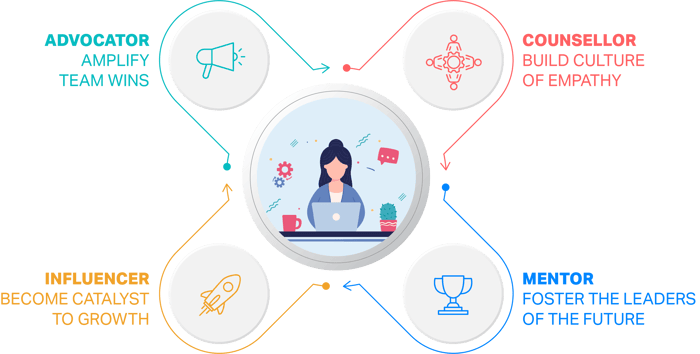
New KRA’s for People Managers
1. Mentor: Foster the Leaders of the Future
When Sir Alex Ferguson joined Manchester United in 1986, he modernized the United’s youth program, which led him to discover some of the greatest players of all time such as David Beckham, Ryan Giggs and more. He realized the need to nurture the talent of the future. Managers of today need to coach their teams in both gateway skills like remote communication and collaboration and the vital skills of better efficiency and productivity.
Companies that invest in employee development see 218% higher revenue per employee
Source – Association of Talent Development, State of Industry Report 2016
How Managers can foster the leaders of tomorrow
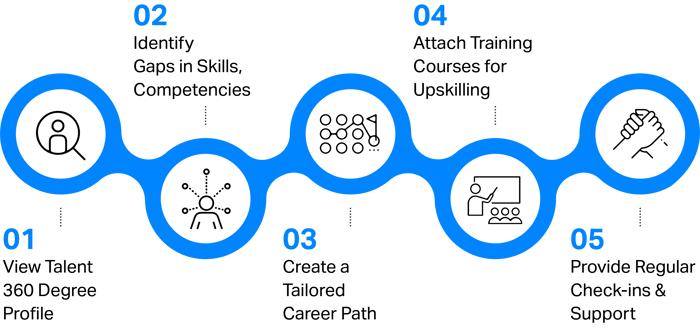
People Managers as Coaches
 View 360-degree talent profile - Get a bird’s eye view of your employee’s profile. Use the talent information available and leverage the AI driven predictive insights to get a clear picture of alignment of your team’s talent as per business needs.
View 360-degree talent profile - Get a bird’s eye view of your employee’s profile. Use the talent information available and leverage the AI driven predictive insights to get a clear picture of alignment of your team’s talent as per business needs. Identify gaps in skills and competencies - Gauge current skills available in the team v/s the expected skillset to deliver productivity. Understand the gaps in terms of competencies which are essential to meet the organizational goals.
Identify gaps in skills and competencies - Gauge current skills available in the team v/s the expected skillset to deliver productivity. Understand the gaps in terms of competencies which are essential to meet the organizational goals. Create a tailored career path - Make it an agenda to understand the expectations and aspirations of the employee.
Create a tailored career path - Make it an agenda to understand the expectations and aspirations of the employee.
 Provide regular check-ins and support - Support them through the journey of development and perform regular check-ins, not just for performance calibration but about their wellbeing. Empathy is the key and employee wellbeing are a priority.
Provide regular check-ins and support - Support them through the journey of development and perform regular check-ins, not just for performance calibration but about their wellbeing. Empathy is the key and employee wellbeing are a priority. Attach training courses for upskilling - Provide tailored coaching and plan their career path to help cover the gaps in skill set, to help them reach their maximum potential. Attach the right learning courses for them to constantly develop their skills.
Attach training courses for upskilling - Provide tailored coaching and plan their career path to help cover the gaps in skill set, to help them reach their maximum potential. Attach the right learning courses for them to constantly develop their skills.
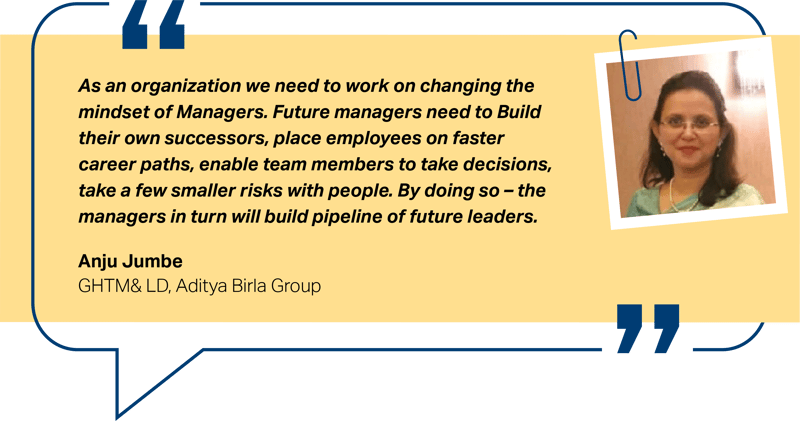
2. Counsellor: Build a Culture of Empathy
The 3C’s of being a Sports Captain say you must be caring, courageous and consistent, which fits exactly in the equation of being an exceptional Manager to build the 4th C of credibility in the system.
The humanitarian crisis of Covid has helped us realize the value of being caring and being human. It is now the responsibility of a manager to recognize the vulnerable folks and treat them with compassion.
75% of HR leaders from midsize companies agree that managers’ have a bigger role to play, yet roles and teams are not structured to support well-being.
Source – HBR Global Employees Survey 2021
This requires the Manager to become counsellors for the future of the workforce.
How Managers can become cultural counsellors
 Start Right - Create frameworks to automatically attach a buddy with new hires to acclimatize them to the new organization ecosystem and avoid initial hiccups.
Start Right - Create frameworks to automatically attach a buddy with new hires to acclimatize them to the new organization ecosystem and avoid initial hiccups. Do interest-based grouping - In times of stress people rely on their communities for support. Manage cohorts which are built on the common interest. Who knows there might be some great bands or strong sports teams sitting right within your team?
Do interest-based grouping - In times of stress people rely on their communities for support. Manage cohorts which are built on the common interest. Who knows there might be some great bands or strong sports teams sitting right within your team? Automate engagement - Automatically trigger tasks for one-on-one conversation if weekly hours are above the defined limit or if an employee has not taken any leave in a few months.
Automate engagement - Automatically trigger tasks for one-on-one conversation if weekly hours are above the defined limit or if an employee has not taken any leave in a few months.
 Get creative – Design refreshing programs every week to unwind from the constant grind of work. Figure out ways to create Virtual Coffee Breaks and hangouts.
Get creative – Design refreshing programs every week to unwind from the constant grind of work. Figure out ways to create Virtual Coffee Breaks and hangouts. Drive data-backed decisions - Be fair in your opinions, reduce any bias by objective data analytics to improve performance of resources. Using analytics can help improve team productivity by 25%.
Drive data-backed decisions - Be fair in your opinions, reduce any bias by objective data analytics to improve performance of resources. Using analytics can help improve team productivity by 25%. Assess regularly - Proactively initiate team surveys to gauge the underlying issues.
Assess regularly - Proactively initiate team surveys to gauge the underlying issues.
3. Advocator: Amplify Team Wins
Validation doesn’t usually come easy but when it does it is 100% gratifying and absolutely a great motivator to perform better. When the Manager takes on the role of an advocator, they are expected to market their team both internally and externally.
86% of employees agree that manager’s trust has a positive impact on their performance.
Source – SHRM Employee Job Satisfaction and Engagement Report
How Managers can become advocators
 Mobilize social networks - Use the organization’s social platforms to boost team achievements – it could be sharing a client’s appreciation on an email or a project getting delivered before expected timelines.
Mobilize social networks - Use the organization’s social platforms to boost team achievements – it could be sharing a client’s appreciation on an email or a project getting delivered before expected timelines. Celebrate the wins - Encourage peer to peer feedback and social recognition using badges which resonate with your organization values to improve respect within the team.
Celebrate the wins - Encourage peer to peer feedback and social recognition using badges which resonate with your organization values to improve respect within the team.
 Create avenues for learning with every project - Initiate multi stakeholder feedback workflows at end of projects to help your team learn and course correct.
Create avenues for learning with every project - Initiate multi stakeholder feedback workflows at end of projects to help your team learn and course correct. Deploy continuous feedback systems - Provide real time feedback to ensure individual efforts are put in the right direction to avoid rework and risks of frustration within the team.
Deploy continuous feedback systems - Provide real time feedback to ensure individual efforts are put in the right direction to avoid rework and risks of frustration within the team.
4. Influencer: Become Catalyst to Innovation
When the world came to a standstill during the pandemic, the one thing that became very clear to organizations at large was that they had to innovate. Innovate to survive, thrive, and grow. But we do not see organizations proactively trying disruptive methods of innovation that challenges the existing structures, protocols, and ways of working. The ability of the organization to disrupt and find new and better ways to serve customers and partners defines a company’s chances to win against competition in any market.
Driving this organizational mandate for growth in teams is an extremely crucial skill that managers should have. Breaking down high-level organizational growth mandates into consumable, contextual goals and KRAs for their teams becomes an important responsibility. They need to be the evangelizers of innovation at every step of the hierarchy.
How Managers can become strong influencers
 Reward innovation - Create recognition programs to specifically award the best innovators / ideas in the team.
Reward innovation - Create recognition programs to specifically award the best innovators / ideas in the team. Plan hybrid work smartly - Pushing the team to collaborate by initiating physical collaboration sessions is still a challenge for managers. Ironically, post pandemic employees need the flexibility of working from home yet want to socialize and brainstorm physically. Create robust rostering systems to help physical interactions between the team members when getting back to work while avoiding risks of overcrowding.
Plan hybrid work smartly - Pushing the team to collaborate by initiating physical collaboration sessions is still a challenge for managers. Ironically, post pandemic employees need the flexibility of working from home yet want to socialize and brainstorm physically. Create robust rostering systems to help physical interactions between the team members when getting back to work while avoiding risks of overcrowding.
 Push existing boundaries - Challenge the limitations and break the status quo to produce something extraordinary.
Push existing boundaries - Challenge the limitations and break the status quo to produce something extraordinary. Encourage creativity - Motivate your employees to bring in ideas that are disruptive, create ‘Innovation Days’ fortnightly and have them present their ideas.
Encourage creativity - Motivate your employees to bring in ideas that are disruptive, create ‘Innovation Days’ fortnightly and have them present their ideas.
Risks of Democratizing HR
When all of this sounds so intuitive, why is it that most organizations are moving gradually, to say the least, in catching on to the trend of enabling managers with these responsibilities?
To get to the bottom of this we spoke with multiple leaders from across BFSI, Automotive, Manufacturing industries and here’s an account of the key concerns that were raised.
Here are some common risks that accompany democratization of HR:
1. De-Centralization of Power
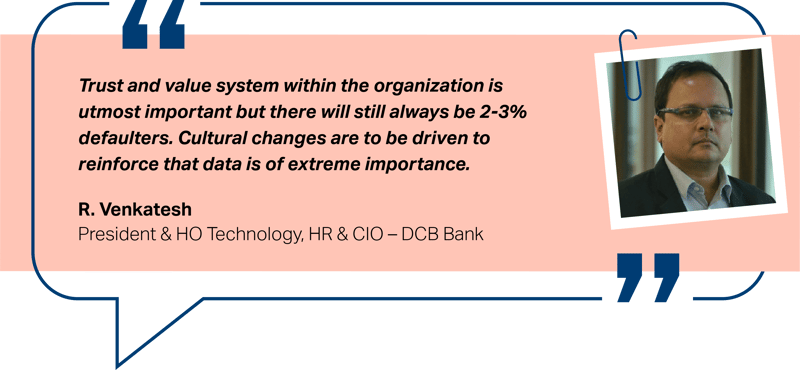
Distribution of HR duties among Managers will require a fair bit of data transparency. But how does an organization make sure the data isn’t misused and there are no or low defaulters? The answer lies in finding tools and technology which can enforce a solid foundation of permission settings. Allow only relevant information to be displayed to the Manager and in case of security breaks or suspicious incidents, trigger automatic workflows that can inform the people in higher positions to take immediate action.
2. Human Bias
It is natural for human bias to creep in when dealing with people problems. A practical solution to prevent any bias and prejudice is to make data-backed decisions. Actioning on insightful analytics makes a good case for the Manager to avoid any conflicts with the team. Use data-driven analytics to help in decision-making and trigger the right conversations with your team.
3. Communication Strategy
Managers are not used to having sensitive conversations and that is not a natural skill set they must possess either. For example, Amit Sigh, Head-HR of SBI Mutual Fund stated how they had entrusted the managers to ensure their employees’ safe return to work. However, that move not only failed but the managers got stuck in the rigmarole of concerns raised by employees. So, the question then is how to make Managers more empathetic yet firm? These new skills would require extensive training and planning from the HRs’ side.
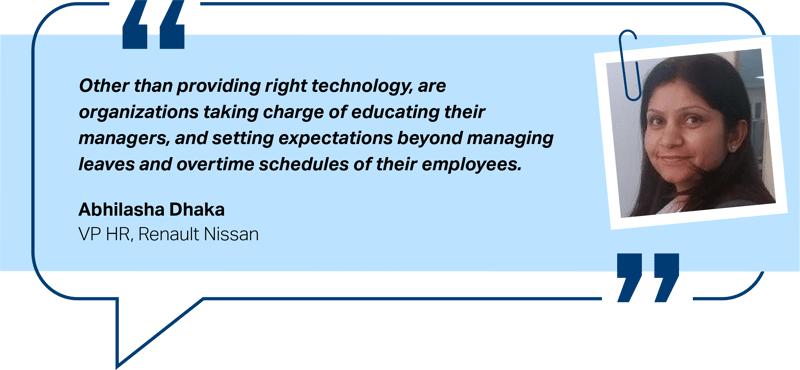
Our exponential enterprises are not prepared yet, rightly said by Abhilasha they would need to educate and set the right expectations about the new role of the Manager.
4. Unclear Protocols
Employee related disputes aren’t something that a manager might be prepared to handle. Balancing between the team and Legal/Employee Relation/Industrial relations is outside the manager’s purview; hence clear protocols should be laid out on when to involve HR. This shift can confuse employees around who to escalate their concerns. To avoid this, HRs need to draft clear protocols around escalations and who would be their point of contact at every stage.
HRs Leading the Exponential Shift
Leaders need help and guidance from HR teams to enable them with the right frameworks, information, and access to be able to take the right decisions for their people. This is an unprecedented opportunity for HRs, who have forever held the mantle of culture, organizational productivity, and wellbeing, to define a great standard for how their people operate and tread forward.
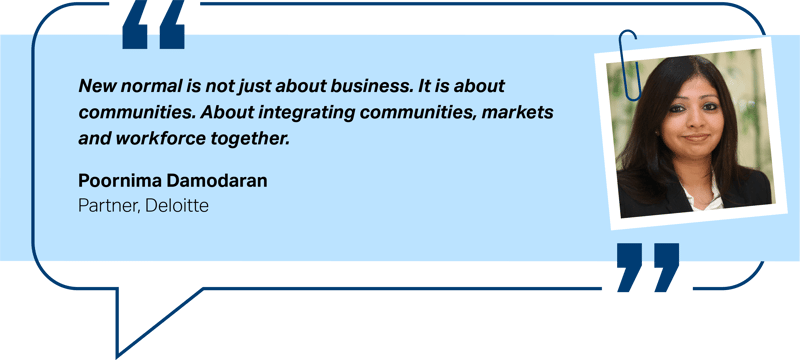
HR leaders will have start viewing organizations as communities that are inclusive of traditional and non-traditional talent. HR units will need to house 4 key strengths, per Mr. Dilip Pattanayak of JSW.
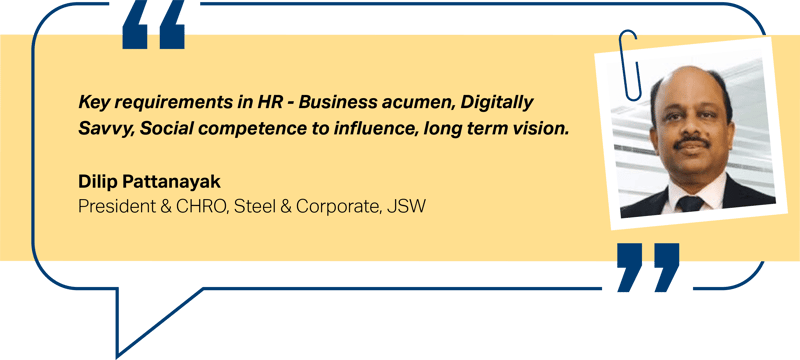
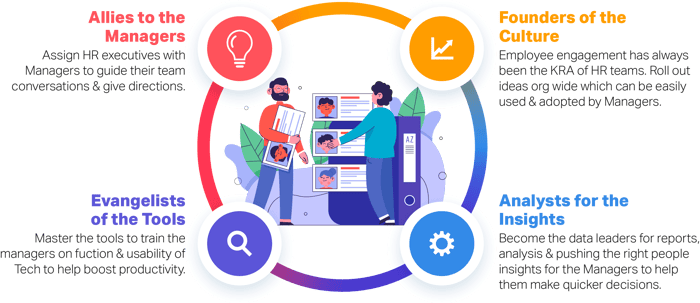
HR as a strategic driver
Here are the emerging roles that HRs must embrace to go beyond the call of duty:
1. Allies to the Managers
Building a well-integrated organization involves forming internal allies first. Manager - HR is one such critical alliance. Here is how it can be done:
 Achieve direct alignment - One on one mapping of an employee with HR is not feasible. In fact, in larger organizations this ratio can look more like 1:500. Aligning directly with Managers makes this ratio considerably low. This could eventually mean much more personalized experiences for the employees.
Achieve direct alignment - One on one mapping of an employee with HR is not feasible. In fact, in larger organizations this ratio can look more like 1:500. Aligning directly with Managers makes this ratio considerably low. This could eventually mean much more personalized experiences for the employees.
 Upskill the manager - Train the Manager to nurture cross-cultural teams and to acknowledge the health-related stress present everywhere in the world. Coach the Manager to support the empathetic conversations making sure they don’t end up saying something insensitive in time of crisis.
Upskill the manager - Train the Manager to nurture cross-cultural teams and to acknowledge the health-related stress present everywhere in the world. Coach the Manager to support the empathetic conversations making sure they don’t end up saying something insensitive in time of crisis.
2. Evangelists of the Tools
In the era of digitization, one thing we know for sure is that exposure to technology is high and with millennials becoming the new Mangers, we can expect them to be digitally savvy and curious. HRs need to constantly keep questioning and pushing the boundary on what's possible with technology. And equip managers and the leaders of the org with the tools that they need to enable better productivity. Here are some tips:
 Train them on the technology - Master the tools to train the managers on function and usability of Tech to help boost productivity.
Train them on the technology - Master the tools to train the managers on function and usability of Tech to help boost productivity. Empower the managers with technology - Make MSS simpler with innovative assistance of with Voice-bots/chatbots and helpdesk to raise concerns.
Empower the managers with technology - Make MSS simpler with innovative assistance of with Voice-bots/chatbots and helpdesk to raise concerns. Ensure adoption - Make sure these tools are flexible to be used on Mobile as that can really make the adoption so much easier.
Ensure adoption - Make sure these tools are flexible to be used on Mobile as that can really make the adoption so much easier.
 Involve them in smart hiring - AI based Tech for Scoring and Recommendations allows Managers to actively participate in the process of hiring. Give them tools to help with screening of candidate forms easily based on each parameter of the predefined benchmarks.
Involve them in smart hiring - AI based Tech for Scoring and Recommendations allows Managers to actively participate in the process of hiring. Give them tools to help with screening of candidate forms easily based on each parameter of the predefined benchmarks. Focus on action - Provide Managers with focused Tasks inbox that can help them get focused output.
Focus on action - Provide Managers with focused Tasks inbox that can help them get focused output.
3. Founders of the Culture
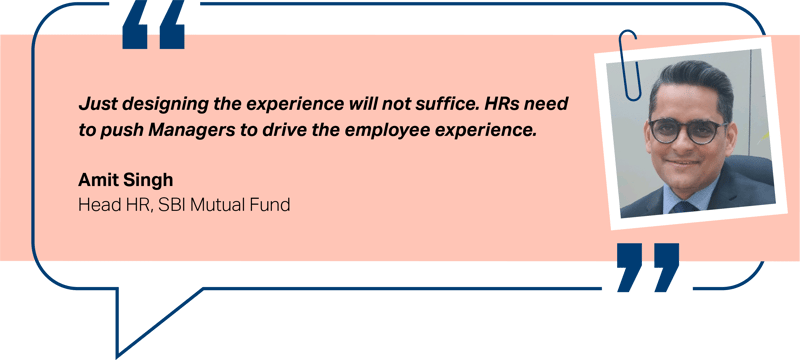
Driving a strong culture that’s built on company’s core values and principles is a newer, if not harder challenge now. It’s time to lend better stereotypes to today’s pop culture, because those rangoli memes are dying a fast death in the new hybrid reality
 Make managers drive culture - HRs will be required to be the guiding force when it comes to pushing cultural initiatives and training Managers to fulfill them successfully.
Make managers drive culture - HRs will be required to be the guiding force when it comes to pushing cultural initiatives and training Managers to fulfill them successfully. Assess pulse and automate workflow - Social Listening via Pulse and tailoring responses to initiate an automatic workflow for Manager will become critical.
Assess pulse and automate workflow - Social Listening via Pulse and tailoring responses to initiate an automatic workflow for Manager will become critical.
4. Analysts for the Insights
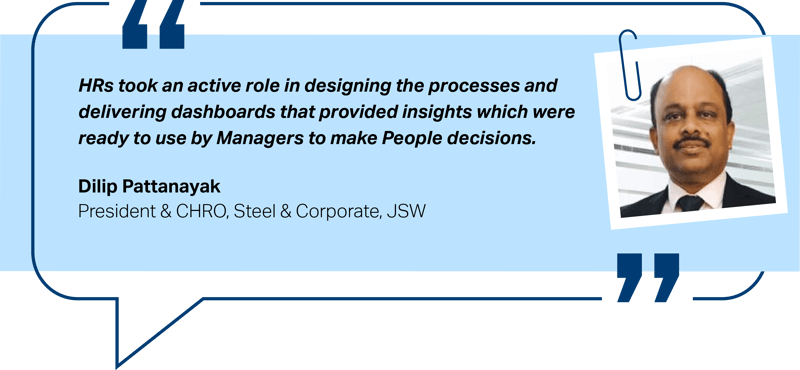
People analytics tools can help collect, structure, analyze, and report on HR processes and data but aligning it in accordance with what is best for business and taking actions that reflect in eventual growth is the role that the HR must play.
 Provide the right data tools - Provide tools for managers to send weekly / monthly reports highlighting deltas in headcount budgeting and staffing, skill gaps and more.
Provide the right data tools - Provide tools for managers to send weekly / monthly reports highlighting deltas in headcount budgeting and staffing, skill gaps and more. Enable them with Data - Become the data leaders for reports, analysis and pushing the right people insights for the Managers to help them make quicker decisions.
Enable them with Data - Become the data leaders for reports, analysis and pushing the right people insights for the Managers to help them make quicker decisions.
Top 10 traits of Exponential HR
Source – Exponential HR | Deloitte US
This calls for new roles to emerge within the HR Function to successfully manage the exponential shift. This requires the HR Team which will be Digital. The experimental mindset to continuously test, apply and distribute technologies to produce highly integrated workforce that is built to take on the challenges of time. Responsibility of support and push for managers to have the right tools and fulfil their goals lies in the hands of HRs. Create a well networked organization where collaboration is as easy as pie. To achieve this, we expect HRs to excel and evolve which was covered in Deloitte’s report of Exponential HR.
Meaningful - Ensures that every team and individual on the team understands the purpose, desired outcome, and most importantly meaning of everything they do, encouraging, empowering, and coaching teams to achieve their shared ambition.

Customer-centric - Focuses on customers and their needs as the starting and end points for every initiative and solution with a broad definition of customers (e.g., extended workforce).

Team ignitor - Assembles and knits together network teams that rally around a cause and deliver business solutions.

Innovative thinker - Constantly considers and investigates new ways to perform work and deliver value, with openness to creative ideas and experimentation.

Integrator - Operates with the complete story in mind, understands connections, creates bridges, and seamless experiences by linking people, ideas, and initiatives to common goals.

Entrepreneur - Relentlessly explores opportunities, tackles problems, and discovers and implements new ways of working to achieve better results through an ownership of outcomes.

Action-oriented - Leans into execution with accountability, tests, and learns, and pushes iterative design and development.

Digitally literate - Embraces a digital world with the capability to envision and build new business models, tools, and ways of working informed by digital.

Data-obsessed - Feels passionate about, understands, and uses data to anticipate issues, identify opportunities, diagnose, test ideas, and design and improve solutions.

Ambidextrous - Applies practices to engage and motivate a blended team full time, part time, gig, contract, multi generational, robotic, or AI in distributed locations local, regional, global to accomplish goals with heightened flexibility

The prerequisite of an exponential enterprise is to have a solid foundation of Digital HR who are ready to fuel the fire in their Managers to deliver results. This shift will take time, could be achieved in multiple phases and sequentially but this is what would become a differentiator for any organization to create a brand that is loved not just by employees but even the employees of future.


